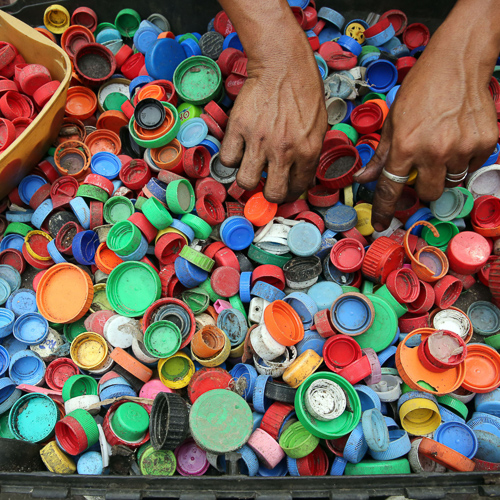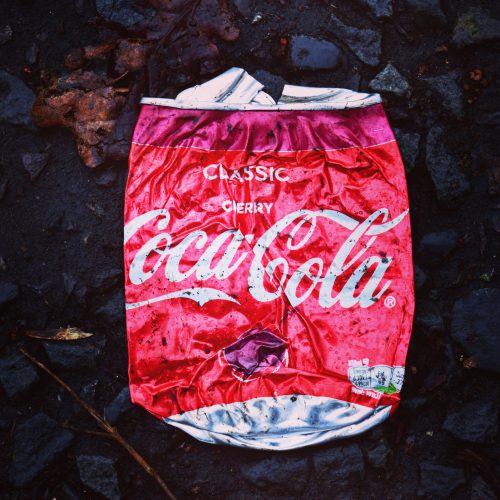28 October 2009 — According to Karachi News Net, plastic goods consumption is expected to double in the next three years in India, most of it from food packaging. This news outlines a scary trend. When Jay and I visited India back in December 2002, I was impressed with how little plastic was used on a daily basis. Families could not afford to buy plastic products that would not last. Instead, they would use stainless steel containers that would be passed on from generations to generations. Most of the food was freshly prepared as refrigerators were not widely available. Tiffin food catering services were used for offering office workers fresh meals delivered to their office doors. This is all changing as mentality is shifting from the long term to the short term. The disposable consumption mentality is making its way deep into middle class India.
Cheering for Fair Trade and Plastic Bag Free Town with a Hot Guy!
I already mentioned in an earlier post that Jay and I are involved in making our town – which is already officially designated as Fair Trade — a single use plastic bag free one. The Plastic Bag Free Town initiative will be launched on Saturday May 9th at the Fair Trade Fair in Wakefield, Quebec, and for the occasion a “fair trade” fashion show will be presented. Jay was recruited as one of the models. He is featured this week on our local newspaper The Low Down. You can see him this week only by clicking here.
Is “Recyclable” the Greenwashing-est Word Around?
20 October 2009 — Rachel Cernansky, reporter at Planet Green recently wrote that “a brand that claims it is helping the environment by manufacturing recyclable products is not doing much more than greenwashing” (seeRecyclable Is Not Recycled: Why Recyclable is the Greenwashing-est Word Around). She gives plastic as an example of a product that is bad before, during and after its life cycle as a product. She is absolutely right. Only about 6.8% of all plastics are actually recycled. With such a small “success rate” you can safely say that in all practicality plastic is not really recyclable. Plastic is only marginally recyclable. In that context, taking pride of the fact that the plastic product you buy is green because it is recyclable is absolute greenwashing. I could not agree more.
The Disappearing Male — A Documentary to Watch
3 July 2009 — I recently discovered an extremely troubling documentary on the effects of endocrine disrupting chemicals, notably phtalates, Bisphenol A and brominated flame retardants (PBDEs) which are widely found in plastics, on the male population. These chemicals are said to affect males more directly than females because they cause an hormonal imbalance in the mother’s womb at the time when male reproductive organs are being formed.
One sad example is the Aamjiwnaang First Nation community near Sarnia, Ontario, Canada where the proportion of male live births has been declining continuously since the early 1990s from an apparently stable sex ratio of 50%.
A Plastic Hummer or a Plant-Based Prius?
10 June 2009 — My 6-year old son is passionate about cars, trucks, tractors…essentially anything with motors and wheels. The bigger the better. He likes to taunt me by threatening that when he grows up he’s going to get a ‘plastic Hummer’. Yikes, not what an ecologically minded parent running a plastic alternatives business loves to hear from his progeny. But my son likes the Toyota Prius too, and is fascinated by the hybrid concept and the idea that one day soon we’ll be able to just plug in our car. Now I can’t wait to tell him about the 2009 Prius, which incorporates various types of ‘ecological plastics’ throughout the car. Toyota aims to have these materials eventually make up about 60% of the cars interior.
Coca Cola Wants Your Attention with a Hybrid Plastic-Sugarcane Bottle
31 May 2009 — Coca Cola wants to show it cares about the environment by introducing a new “eco-friendly” bottle for its Dasani water line. The new bottle which will be introduced later this year would be made from a blend of petroleum-based materials and up to 30% of plant-based materials. Initially these materials will include sugarcane and molasses, a by-product of sugar production. According to Coca Cola, the blend could make the recycling process easier and cheaper, and reduce the time that discarded bottles sit in landfills. Are you impressed? You shouldn’t be…
You’ve probably heard about the problem of plastic contamination in recycling plants. The problem is that some of the new plant-based plastics get recycled as if they were polyethylene terephthalate (PET). But when they mix with the other petroleum-based plastics during the recycling process they end up creating a less stable recycled plastic that is of lower quality, hence lower value in the market.
Yikes – Wine in Plastic! I’ll Stick to Glass, Thanks
16 May 2009 — The Wine Industry Association of Western Australia doesn’t think moving from glass to plastic bottles for wine is necessarily a bad idea. I don’t know about you, but it would make me not want to drink the wine. And it appears the Southern Australian wine maker Wolf Blass has already begun to offer some of it’s wines in polyethylene terepthalate (PET) bottles. The main claimed justification is environmental: i.e., that the plastic bottles create 29% less greenhouse gas emissions and are much lighter. There does not appear to be any mention of the move to plastic bottles being significantly cheaper for the winemaker. Greenwashing? Perhaps it was inevitable in this often bottom-line, convenience-driven world we live in, but the thought of vino sitting and aging in plastic just does not seem right.
Help Stop Plastic in the Sea – Support the Algalita JUNKride
12 April 2009 — It outnumbers surface plankton by 6 to 1 in parts of the world’s oceans, including the North Pacific. It suffocates sea turtles from the inside out after they have ingested it thinking it is food. It releases numerous toxic synthetic chemicals into the oceans. Yes, plastic.
If plastic pollution in the oceans is an issue that interests you or one you don’t know anything about, I would strongly suggest checking out the website of the Algalita Marine Research Foundation based in Long Beach, California. The innovative studies being done by Captain Charles Moore and his committed team place them at the vanguard of marine pollution research – and the results they regularly document are alarmingly eye-opening.










